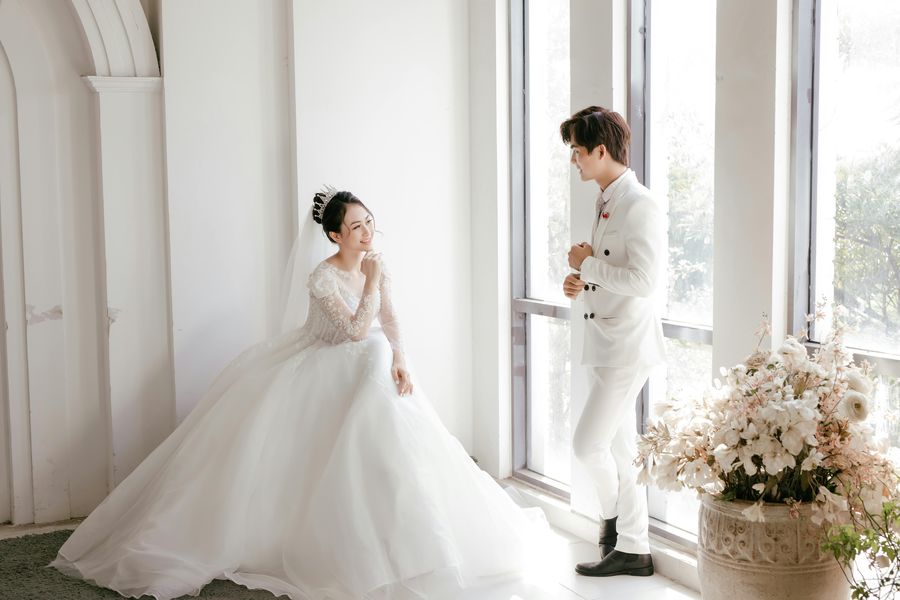Helping Each Other Out
One of the most common problems couples face after retirement is figuring out how to divide responsibilities. You may have spent many years dividing tasks, but retirement can change the dynamics in surprising ways.
Suddenly, you may find yourself with a lot more free time and feel unsure about what to do with it. In these instances, it’s essential to communicate with your partner and determine how you can help each other during this transition.
You might consider sitting down together and making a to-do list of activities that you’d like to do together or separately. This list can include household chores, hobbies, and even future planning.
Working towards shared goals and finding new things to enjoy together can help bring you even closer.
Planning In Advance
Planning for retirement is one thing, but planning for daily activities during retirement is another story. Without a clear sense of direction, it’s easy to find yourself feeling lost or overwhelmed.
Sit down and brainstorm some potential activities now so you won’t feel stuck or bored later. Investing time and effort into finding new interests or hobbies can help fill your days with excitement and new challenges.
Take Care of Your Health
Aging brings its own set of unique challenges, and taking care of your physical and mental well-being should be a top priority. Schedule regular checkups with your doctor and consider joining a fitness class or yoga studio to stay active.
Making healthy choices, such as eating nutritious meals and getting enough sleep, can also help you feel your best.
Create Personal Space
Spending too much time together can sometimes trigger arguments and fights, even for the happiest couples. Creating personal space by establishing clear boundaries can help avoid conflicts and maintain a healthy relationship.
Consider different ways of creating physical and emotional personal space, such as scheduling regular alone time or having separate hobbies.
Pay More Attention
Transitioning into retirement can lead to a sense of isolation and loneliness. It’s important to stay connected with your partner and communicate effectively.
By being an active listener, you can provide support, reduce tension, and avoid unnecessary arguments. Consider scheduling regular check-ins and taking the time to connect genuinely with your partner.
Be Kind To Each Other
Ultimately, retired life is all about love and kindness. Taking care of each other by showing appreciation, respect, and understanding can go a long way.
Remembering why you fell in love in the first place and making time for fun and laughter can help keep your relationship strong and thriving.
Adjusting to Retirement and Surviving Retirement
Retirement is not just a financial milestone; it’s an emotional one as well. New challenges and opportunities arise, and no one can predict how you’ll feel or what you’ll do next.
However, by breaking down these challenges and exploring strategies for addressing them, you can reduce stress and enjoy your golden years to the fullest.
Excitement and Challenges of Retirement
Retirement is an exciting time, full of possibilities and opportunities to indulge in new passions and hobbies. No longer tied to a schedule, you can explore new places, meet new people, or even start a business.
Having a sense of direction and purpose in retirement can help you stay motivated and excited about the future.
Feeling of Isolation and Boredom
Retirement can also bring feelings of isolation and boredom, particularly for those who leave the workforce entirely. With fewer social and professional connections, it’s essential to stay proactive about building new relationships and finding new sources of engagement.
Joining a club, taking a class, and volunteering can all be excellent ways of staying active and connected.
Finding New Activities and Hobbies
Without the structure of a job, figuring out how to fill your days can be challenging. Retirement is the perfect opportunity to discover new hobbies or interests that you never had time to explore before.
Whether it’s painting, gardening, or learning a new language, there’s something out there for everyone. Don’t be afraid to experiment and try new things; who knows what you might end up loving?
Building New Social Connections
After retiring, it’s not uncommon to feel like you’ve lost touch with former colleagues or friends. Building new social connections can help combat loneliness and broaden your horizons.
Consider going to networking events or joining social clubs that cater to your interests. Don’t shy away from the opportunity to make new friends and meet new people.
Financial Planning and Budgeting
Planning for retirement includes financial planning, but this doesn’t stop once you retire. You’ll need to continue managing your finances to ensure your money lasts for as long as you do.
Creating a budget and sticking to it can help you manage your funds effectively. Consider talking to a financial planner or accountant if you’re unsure of where to begin.
Supporting Each Other During the Transition
Finally, it’s important to remember that you and your partner are in this together. Supporting each other during the transition is crucial for a happy and fulfilling retired life.
Take the time to empathize with each other’s emotional needs and work together to find solutions. Celebrate each other’s successes and lift each other up during difficult times.
Together, you can make the most of your retired life and live it to the fullest. In conclusion, retirement is not without challenges, but it’s also full of potential for joy and fulfillment.
By staying proactive, communicating openly, and supporting each other, you can overcome these challenges and create a happy and exciting retired life. Enjoy the journey and make the most of every precious day!
Communication in Retirement
In any relationship, communication forms the foundation for building intimacy, understanding, and empathy.
For couples, communication is particularly crucial after retirement when new challenges arise, and individuals may feel more vulnerable or at a loss for what to do. In this article, we explore the importance of communication in ensuring a healthy and fulfilling retired life.
Understanding Each Other’s Needs
Everyone has different needs and expectations in a relationship, which is why it’s vital to communicate openly and honestly about what you want. Identifying and sharing your needs and expectations can help prevent misunderstandings and hurt feelings down the line.
Make sure to actively listen to your partner, empathize with their point of view, and negotiate solutions that work for both of you.
Expressing Feelings and Concerns
Retirement brings with it a host of new transitions and changes, many of which can be overwhelming or stressful. Expressing feelings and concerns honestly and authentically can help you process these changes and work through them effectively.
Whether it’s fear, anxiety, or excitement, vocalizing your emotions and concerns creates a safe space for both partners to discuss and process what’s going on.
Resolving Conflicts
It’s natural for couples to experience conflicts now and then. However, the key to a healthy relationship is how you resolve these conflicts.
Effective conflict resolution means active listening, non-judgmental problem-solving, and negotiation. Finding common ground and working through conflicts with empathy and respect strengthens trust and intimacy in a relationship.
Active and Passive Listening
Active listening means giving your full attention and focus to your partner, while passive listening indicates you may be distracted and disinterested. Active listening demonstrates respect and empathy for your partner and enhances overall communication in a relationship.
It allows you to fully understand your partner’s perspective and helps you avoid misunderstandings.
Non-Verbal Communication
Non-verbal communication, including body language and tone of voice, can play a significant role in how effectively you communicate with your partner. Be mindful of your body language and tone of voice when interacting with your partner.
It’s essential to use a tone of voice that is respectful and open and maintain appropriate eye contact.
Seeking Professional Help If Needed
Sometimes, couples need help beyond what they can do on their own. Seeking the guidance of a trained professional, such as a therapist or counselor, can help couples work through complex challenges and build healthy communication skills.
A professional can help you learn new techniques to communicate effectively and strengthen your relationship.
Maintaining a Healthy Lifestyle
A healthy lifestyle positively impacts both physical and mental health. By cultivating healthy habits, couples can feel happier, more energized, and more capable of sustaining their relationship over time.
Physical Health
Physical health is essential for individuals who aim to enjoy their retired life to the fullest. Physical exercise, getting a balanced diet, and scheduling regular check-ups with your doctor should be on top of your list.
This means making time for daily exercise to maintain physical fitness, consuming a well-balanced diet high in nutrients, and scheduling regular checkups with your doctor to prevent and manage any medical issues.
Mental Health
Mental health is equally as important as physical health. Practicing mindfulness, meditation, and relaxation techniques can help couples feel more relaxed, grounded, and present in the moment, leading to happier and more fulfilling retired lives.
Quality Sleep
Quality sleep is an essential component of healthy living. Good sleep hygiene practices can help couples improve their sleep quality and overall well-being.
This includes cultivating a regular sleep schedule, creating a comfortable sleep environment, and avoiding stimulants like caffeine or electronic devices before bedtime.
Avoiding Unhealthy Habits
Harmful habits, such as smoking, excessive alcohol consumption, or substance abuse, can severely impact a couple’s physical and mental health over time. Recognizing these negative habits and working to eliminate them can lead to improved resilience, greater happiness, and a stronger relationship.
Encouraging Each Other for Healthy Living
Finally, couples play an important role in supporting each other’s healthy habits and choices. Encouragement, motivation, and support can help couples stay on track and achieve their goals.
Find activities that you can do together, such as taking walks, signing up for a class, or trying out a new hobby as a way to incorporate healthy habits into your relationship. In conclusion, communication and healthy living are critical components of a happy and fulfilling retired life.
By putting effort into actively listening, expressing feelings and concerns, and seeking out professional help when necessary, couples can strengthen their relationship and weather any challenge together. Cultivating healthy lifestyle habits ensures that physical and mental well-being is maintained, maximizing enjoyment and happiness in the golden years.
Finding Purpose and Meaning in Retirement
Retirement offers a unique opportunity for individuals to explore new possibilities and create meaning and purpose beyond the traditional work setting. Finding new goals and interests can lead to a fulfilling and meaningful retired life.
In this article, we explore several strategies to help retirees find purpose and meaning in their lives.
Pursuing Lifelong Goals
Retirement offers a chance to revisit and pursue lifelong goals that were once put on hold. Engaging in activities that bring joy and a sense of accomplishment can be incredibly beneficial.
It is never too late to start pursuing new goals or return to previous ones. This may include learning a new skill, writing a memoir, or traveling to a dream destination.
Volunteering and Giving Back to the Community
Volunteering and giving back to others can help us feel connected and valued. There are numerous organizations that rely on volunteers where one can positively contribute to the community.
This may include mentoring young people, helping the elderly, or working with local charities. Volunteering not only gives back, but it can also create a sense of purpose and belonging.
Exploring New Opportunities
Exploring new opportunities involves stepping out of one’s comfort zone and discovering new possibilities. Retirement opens opportunities for learning and new experiences; it can be anything from trying out a new hobby, attending lectures, or joining a local group.
Exploring new opportunities can give retirees a sense of excitement and fulfillment, which ultimately boosts mental and emotional well-being.
Finding New Passions and Interests
Retirement is an excellent time to find new passions and interests that fulfill and bring purpose. This involves trying out different activities, exploring new environments, and seeking out new experiences.
It is important to approach this with an open mind and a willingness to try new things. Whether discovering a passion for gardening, painting, or hiking, finding new interests can lead to a sense of renewed purpose and direction in life.
Investing in Personal Growth and Development
Personal growth and development are essential in retirement. This means identifying opportunities to improve skills, develop talents, and expand one’s knowledge base.
This can involve taking classes, joining a book club, or learning something new. Investing in personal growth and development provides an opportunity for self-reflection, keeps the mind sharp, and overall contributes to greater life satisfaction.
Reinventing Oneself and Discovering New Identities
Retirement provides a unique opportunity to shed old identities and develop new ones. Reinventing oneself requires taking the time to reflect on how one wants to live their retired life and identify new values and purpose.
This may involve building new relationships, pursuing new interests or traveling to new places. It’s a chance to re-evaluate how we present ourselves to the world, understand what we want, and take steps to make those realities come true.
In conclusion, finding purpose and meaning in retirement is vital for individuals to have a satisfying and fulfilling experience. Pursuing lifelong goals, volunteering, exploring new opportunities, finding new passions and interests, investing in personal growth, and reinventing oneself and discovering new identities are all pathways to a more meaningful and purposeful retired life.
By trying out new things, stepping outside of the box, and being open to new possibilities, retired individuals will truly discover that the golden years can be as enriching and rewarding as their earlier ones. In conclusion, retirement is a time of transition and new experiences.
While navigating these changes may be challenging, there are strategies that retirees can use to ensure a fulfilling, healthy, and purposeful retired life. Key factors for a successful retirement include open communication, maintaining a healthy lifestyle, and finding meaning and purpose in life.
By actively considering these strategies, retiring individuals can create an enriching and positive experience that fosters growth, engagement, and enjoyment in the golden years. Ultimately, retirement can be a time of personal growth, fulfillment, and satisfaction if individuals take the time to prioritize and invest in themselves.



